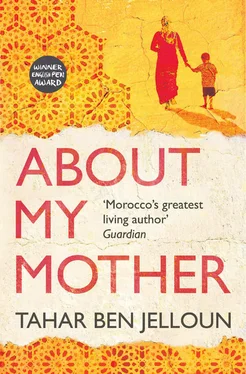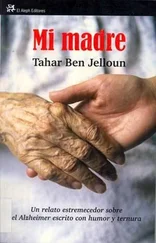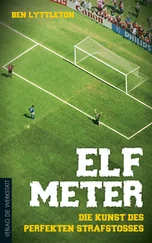Mother doesn’t understand why Keltum’s making her wash herself again. Keltum’s in a bad mood, she’s being very abrasive. My mother protests, so does Rhimou, who doesn’t like Keltum’s attitude. I look on from the corridor, entirely helpless. Mother’s crying. She sobs like a child caught misbehaving. I look away. I say to myself: I might have come half an hour before or after this incident. Maybe Keltum left her sitting in her shit to make me realise how much she does when I’m not here. It’s quite possible. ‘This is what I have to put up with. It’s all very well for you, you just drop in briefly, give your mother a kiss, ask her to pray for you and bless you, and then you leave. But I’m here all the time, coping with her sleeplessness, pandering to her fantasies, cleaning up her shit, putting on her pads, crawling around on all fours to clean the floor. That’s right, your mother can’t control herself any more, she pisses and she shits. Me, I’ve got used to it, but you, you pull a face and look away. I get the feeling I’m the one who’s ill, I’m the one losing my mind, and when I wash her, it’s as if I’m washing myself. And I think of her — not quite ten years ago she was ill, but she was still cooking, she was clean, she cared about her appearance. We’d talk about all kinds of things, serious and trivial, big and small. We’d even laugh.’
Mother is saying her prayers. Keltum asks her to stop making those gestures and rolling her eyes. She prays sitting down, in silence. But praying without first doing one’s ablutions doesn’t count. She claims she’s clean, because she’s just come back from the Makhfiya hammam in Fez. It’s a hot day. There were a lot of women there but she was treated well. ‘The hammam was full, Salma had kept me a place not far from the hot-water spout. I had three buckets, and she rubbed me all over my back, legs and arms. I had a good wash in spite of the women coming in from other neighbourhoods. Everyone likes this hammam best because it’s big, clean and well-maintained. I must say, I can’t wash in any other hammam and of course Salma’s known me for such a long time. She knows what I need. She has the right touch. The other day, I gave her a gold bangle to thank her. She couldn’t believe her eyes. That’s why I have no jewellery left — I’ve given it all away. I like giving things away.
‘Where’s my white caftan got to, the one I put on after bathing? I’m not imagining it, I remember perfectly well. I took it out of the wardrobe, sprinkled it with orange-blossom water, and took out my underwear too — white socks, my canary-yellow scarf, my embroidered handkerchief — everything I needed to go out. If you don’t believe me, ask Habiba, she helped me get it all ready. What? You don’t know Habiba? You’re doing this on purpose, pretending not to believe me, you’re all conniving against me. I have to say my prayers again, give me the polished stone. Too bad about the white caftan. I’ll wear it after the next visit to the hammam.’
Mother isn’t suffering, she’s in her own world. The minute I arrive, she calls the servants to set the table and put the pots on to boil. Today she’s decided we’re going to eat lamb kebabs. She says she made them the day before and they’re marinating with parsley, coriander, finely chopped onion, cumin, pepper, paprika, salt and a drop of olive oil. She asks Keltum to light the kanoun to grill the meat. She also announces that she’s made a chicken tagine with olives and preserved lemons. She says she peeled two onions, then added oil, water, ginger, pepper, salt and a few strands of pure saffron, mixed all the ingredients, then heated them over a gentle flame. She reminds Keltum that the chicken absolutely must be a free-range, local hen, not battery-farmed. That’s what she’s cooked for us. Except that it’s not lunchtime and there are no kebabs and no tagine. Yet Mother’s overjoyed, inhaling deeply as if she’s smelling the aroma of all these dishes.
‘I’m not at all hungry,’ she says. ‘All these pills are ruining my appetite. But what gives me great pleasure is watching you eat what I’ve made for you. That’s my joy. Whatever you do, don’t tell me you’re going to your friends’ house or your brother’s. No, I won’t let you. Tell them your mother’s spent the whole day making the food you love. So once the table’s set and you’re all sitting round, I’ll eat just by watching you. Tomorrow I’ll cook for your father. I’ll make him his favourite dish — calves’ feet with a little wheat and some chickpeas. I’ll season it and let it simmer on the wood fire all night long. It’ll be delicious. I’ve already asked Keltum to go to Bouchta, Fez’s best butcher, to buy the calves’ feet. They need to be cleaned and the fuzz scraped off, then left to soak in brine for a long time. You have to be careful with the garlic, you know, so it doesn’t cause bad breath, you have to open it and take out the green shoot, that’s the culprit. People don’t know how to prepare it.’
‘But Yemma, Father’s no longer with us. He passed away eleven years ago.’
‘Oh all right, he’s dead. That doesn’t matter, it’s his favourite. We still need to make him happy — even the dead need our attention. So, tomorrow he can feast. What are you doing? Where are you going? The meal’s ready, sit down … What, you’re going home? This is your home. Your father’ll be along any minute — go on, get on the phone and call him. If he doesn’t answer, it means he’s on his way. He won’t take taxis. He always says there’s nothing better than walking, but I know he’s saving money, too. Your father’s never been a big spender. He’s careful with his money, he hasn’t got much, we live very simply. I tell him we’ll be rich when I inherit from my father, he has land on the Imouzzer road, but he doesn’t look after it. I know I’ll have my share one day, but we don’t talk about that in our family while my father’s still alive. It’s shameful to think about inheriting, and anyway you never know who’ll go first. God has His secrets. I live in God’s secret heart, He guards me and protects me from evil. When my time comes, I’ll only have to close my eyes and profess my faith: there’s no other God but God and Muhammad is His prophet. I’ll say those words forever, until I am no more, until silence and serene night.’
I arrive unannounced. I find Keltum with two young women — pretty, expertly made-up, looking embarrassed, and both clutching mobile phones. Keltum says: ‘These are my eldest son’s daughters, they work in the free zone at the port, in the garment factories.’ The girls get up, barely say goodbye to my mother, give me a sidelong glance as if we had dealings in common, then vanish. Keltum sees them out. I can tell she’s uncomfortable. I say nothing. She repeats that they’re her eldest granddaughters and they’re good girls. I don’t say a word, and she continues to make excuses for their presence. I understand and go and sit beside my mother, who says to me in a hushed voice: ‘They’re her daughter’s daughters, or her son’s daughters, she has so many children, maybe six or seven, I get muddled. The boys don’t do anything, only the girls work. May God punish me for an evil thought, but I think … no, I’m not saying a word, I didn’t even think it … Life is hard … They have phones they put in their pockets, and me with this telephone that’s constantly out of order, with a cable that doesn’t even stretch as far as my bed … Do something, buy me a phone like those girls have, I won’t know how to work it, just get a receiver so I can speak to you. I’ve had enough of this one with a wire, when you call me — you see, it’s tied to the other wire with a bit of string. It’s not very practical. If I pull on it at all, I can’t get a dialling tone. When it doesn’t work, my heart beats like mad, I start thinking that that’s the moment you’re going to call and be answered by nothingness, so do something … Those two girls come to see Keltum a lot. I think they give her money, or maybe she gives them some of our savings. They say they have fiancés, but nothing specific … I’ve never had a fiancé myself, I went from childhood games to the nuptial bed, where a man was waiting for me. I was frightened. Facing the unknown. Just think, son, how things have changed. I would close my eyes. I’ve forgotten the rest. Girls go to work. How much do they make? I wonder. They have jewellery and shoes imported from Spain. Their father doesn’t work any more. He used to have a lorry, but he had an accident, they found out he had no insurance and his licence was fake. He almost went to prison. They took away his lorry. Luckily, no one died, no one was hurt. So he’s out of work. His daughters went out on the street. Keltum says they work at the port but sometimes they come to see her in the morning, early, when they ought to be at the factory. I haven’t lost my mind, I see everything, I notice everything, but I don’t dare think nasty thoughts.
Читать дальше












